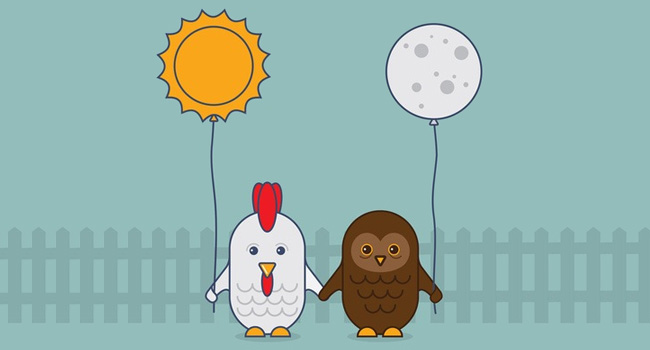Some individuals find themselves waking up with the birds, while others are falling asleep to them. People who wake up late have been stigmatized by society as being lazy, while those up at the break of dawn were perceived as the go-getters; however, studies are showing that the inverse is most likely true. Research conducted in 2010 at the London School of Economics and Political Science showed that people with higher IQs are more likely to be nocturnal. Furthermore, a person’s sleep schedule is almost entirely genetically predetermined and certainly not a mark of competence.
A study published in the journal Annals of Neurology in 2012 discovered variations within a specific gene, PER1, which is among a group of genes that affect human behavioural rhythms. These can then be linked to the circadian system—the body’s internal 24-hour clock.
The team first determined participants’ daily activity peak—known as the acrophase—over a week-long period via actigraphic measurements (a device similar to a wrist-watch to measure a person’s activity). By then, comparing the genomes of individuals to the genes researchers believed were correlated to sleep rhythms specific polymorphisms—single nucleotide mutations within the genome—were detected. These were then paired with the actigraphic records of the participants, and allowed the researchers to determine how specific polymorphisms affected an individual’s daily rhythm. The research suggests that a single change in PER1 can alter your waking time by by as much as an hour.
For some, it seems impossible that a point mutation in one gene could cause such a dramatic change in sleep preferences. However, these differences are seen elsewhere too.
“Night owls [have] significantly less white matter [in their brains], and as a result, there are fewer pathways for feel-good hormones such as serotonin or dopamine to travel through,” explained the host Mitchell Moffitt in an ASAPScience video. “But it’s not all bad for the late-nighters. In fact, they tend to be much more creative, have been found to have higher cognitive abilities, and are known to be risk-takers.
While the cause of this decrease in white matter is unclear—some scientists attribute it to a sort of ‘social jet lag’ experienced by night owls—it’s presence is linked to increased susceptibility to depression and disruptions of normal cognitive functions.
Individual dispositions to sleep or wakefulness have huge impacts on cognitive performance and lifestyle, even beyond uncontrollable physical traits. In today’s society, an early bird lifestyle is favoured; most work and school days are structured in an 8 a.m. to 5 p.m. manner. By forcing night owls to go against their body’s natural rhythm, late-risers are more vulnerable to depression, sleep disturbances, and substance abuse.
“[Early birds] tend to get better grades in school, which gets them into better colleges, which then leads to better job opportunities,” explained Christopher Randler, a biology professor at the University of Education in Heidelberg to PsychologyToday. “Morning people also anticipate problems and try to minimize them. They’re proactive.”
To further understand and narrow the definitions of individuals based on sleep-preference, The American Academy of Sleep Medicine categorized individuals based on their disposition to sleep and wakefulness; people can be categorized as early (EC), late (LC) or intermediate (IC) chronotypes. In the study, researchers showed that LC individuals had lower first-year university GPAs than EC students, however, for the most part had comparable GPAs by their last year in university. The scientists believe that this is due to students understanding their chronotypes and taking courses accordingly; however, following re-entry into structured society, these individuals once again suffer in order to adapt.
The solution to this, many scientists have theorized, is to allow employees to work at their most productive hours of the day—be it night or day. However, the challenge remains in how to accommodate all of these individuals.









